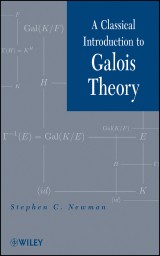Details

A Classical Introduction to Galois Theory
1. Aufl.
|
75,99 € |
|
| Verlag: | Wiley |
| Format: | EPUB |
| Veröffentl.: | 29.05.2012 |
| ISBN/EAN: | 9781118336847 |
| Sprache: | englisch |
| Anzahl Seiten: | 296 |
DRM-geschütztes eBook, Sie benötigen z.B. Adobe Digital Editions und eine Adobe ID zum Lesen.
Beschreibungen
<p><b>Explore the foundations and modern applications of Galois theory</b></p> <p>Galois theory is widely regarded as one of the most elegant areas of mathematics. <i>A Classical Introduction to Galois Theory</i> develops the topic from a historical perspective, with an emphasis on the solvability of polynomials by radicals. The book provides a gradual transition from the computational methods typical of early literature on the subject to the more abstract approach that characterizes most contemporary expositions.</p> <p>The author provides an easily-accessible presentation of fundamental notions such as roots of unity, minimal polynomials, primitive elements, radical extensions, fixed fields, groups of automorphisms, and solvable series. As a result, their role in modern treatments of Galois theory is clearly illuminated for readers. Classical theorems by Abel, Galois, Gauss, Kronecker, Lagrange, and Ruffini are presented, and the power of Galois theory as both a theoretical and computational tool is illustrated through:</p> <ul> <li>A study of the solvability of polynomials of prime degree</li> <li>Development of the theory of periods of roots of unity</li> <li>Derivation of the classical formulas for solving general quadratic, cubic, and quartic polynomials by radicals</li> </ul> <p>Throughout the book, key theorems are proved in two ways, once using a classical approach and then again utilizing modern methods. Numerous worked examples showcase the discussed techniques, and background material on groups and fields is provided, supplying readers with a self-contained discussion of the topic.</p> <p><i>A Classical Introduction to Galois Theory</i> is an excellent resource for courses on abstract algebra at the upper-undergraduate level. The book is also appealing to anyone interested in understanding the origins of Galois theory, why it was created, and how it has evolved into the discipline it is today.</p>
<p>Preface xi</p> <p><b>1 Classical Formulas 1</b></p> <p>1.1 Quadratic Polynomials 3</p> <p>1.2 Cubic Polynomials 5</p> <p>1.3 Quartic Polynomials 11</p> <p><b>2 Polynomials and Field Theory 15</b></p> <p>2.1 Divisibility 16</p> <p>2.2 Algebraic Extensions 24</p> <p>2.3 Degree of Extensions 25</p> <p>2.4 Derivatives 29</p> <p>2.5 Primitive Element Theorem 30</p> <p>2.6 Isomorphism Extension Theorem and Splitting Fields 35</p> <p><b>3 Fundamental Theorem on Symmetric Polynomials and Discriminants 41</b></p> <p>3.1 Fundamental Theorem on Symmetric Polynomials 41</p> <p>3.2 Fundamental Theorem on Symmetric Rational Functions 48</p> <p>3.3 Some Identities Based on Elementary Symmetric Polynomials 50</p> <p>3.4 Discriminants 53</p> <p>3.5 Discriminants and Subfields of the Real Numbers 60</p> <p><b>4 Irreducibility and Factorization 65</b></p> <p>4.1 Irreducibility Over the Rational Numbers 65</p> <p>4.2 Irreducibility and Splitting Fields 69</p> <p>4.3 Factorization and Adjunction 72</p> <p><b>5 Roots of Unity and Cyclotomic Polynomials 80</b></p> <p>5.1 Roots of Unity 80</p> <p>5.2 Cyclotomic Polynomials 82</p> <p><b>6 Radical Extensions and Solvability by Radicals 89</b></p> <p>6.1 Basic Results on Radical Extensions 89</p> <p>6.2 Gauss’s Theorem on Cyclotomic Polynomials 93</p> <p>6.3 Abel’s Theorem on Radical Extensions 104</p> <p>6.4 Polynomials of Prime Degree 109</p> <p><b>7 General Polynomials and the Beginnings of Galois Theory 117</b></p> <p>7.1 General Polynomials 117</p> <p>7.2 The Beginnings of Galois Theory 124</p> <p><b>8 Classical Galois Theory According to Galois 135</b></p> <p><b>9 Modern Galois Theory 151</b></p> <p>9.1 Galois Theory and Finite Extensions 152</p> <p>9.2 Galois Theory and Splitting Fields 156</p> <p><b>10 Cyclic Extensions and Cyclotomic Fields 171</b></p> <p>10.1 Cyclic Extensions 171</p> <p>10.2 Cyclotomic Fields 179</p> <p><b>11 Galois’s Criterion for Solvability of Polynomials by Radicals 185</b></p> <p><b>12 Polynomials of Prime degree 192</b></p> <p><b>13 Periods of Roots of Unity 200</b></p> <p><b>14 Denesting Radicals 225</b></p> <p><b>15 Classical Formulas Revisited 231</b></p> <p>15.1 General Quadratic Polynomial 231</p> <p>15.2 General Cubic Polynomial 233</p> <p>15.3 General Quartic Polynomial 236</p> <p>Appendix A Cosets and Group Actions 245</p> <p>Appendix B Cyclic Groups 249</p> <p>Appendix C Solvable Groups 254</p> <p>Appendix D Permutation Groups 261</p> <p>Appendix E Finite fields and Number Theory 270</p> <p>Appendix F Further Reading 274</p> <p>References 277</p> <p>Index 281</p>
<p><b>STEPHEN C. NEWMAN, MD, MSc</b>, is Professor Emeritus of Psychiatry at the University of Alberta, Canada. He has published widely in psychiatric epidemiology and epidemiologic methods. Dr. Newman is the author of <i>Biostatistical Methods in Epidemiology</i> (Wiley).</p>
<p><b>Explore the foundations and modern applications of Galois theory</b></p> <p>Galois theory is widely regarded as one of the most elegant areas of mathematics. <i>A Classical Introduction to Galois Theory</i> develops the topic from a historical perspective, with an emphasis on the solvability of polynomials by radicals. The book provides a gradual transition from the computational methods typical of early literature on the subject to the more abstract approach that characterizes most contemporary expositions.</p> <p>The author provides an easily-accessible presentation of fundamental notions such as roots of unity, minimal polynomials, primitive elements, radical extensions, fixed fields, groups of automorphisms, and solvable series. As a result, their role in modern treatments of Galois theory is clearly illuminated for readers. Classical theorems by Abel, Galois, Gauss, Kronecker, Lagrange, and Ruffini are presented, and the power of Galois theory as both a theoretical and computational tool is illustrated through:</p> <ul> <li>A study of the solvability of polynomials of prime degree</li> <li>Development of the theory of periods of roots of unity</li> <li>Derivation of the classical formulas for solving general quadratic, cubic, and quartic polynomials by radicals</li> </ul> <p>Throughout the book, key theorems are proved in two ways, once using a classical approach and then again utilizing modern methods. Numerous worked examples showcase the discussed techniques, and background material on groups and fields is provided, supplying readers with a self-contained discussion of the topic.</p> <p><i>A Classical Introduction to Galois Theory</i> is an excellent resource for courses on abstract algebra at the upper-undergraduate level. The book is also appealing to anyone interested in understanding the origins of Galois theory, why it was created, and how it has evolved into the discipline it is today.</p>

















